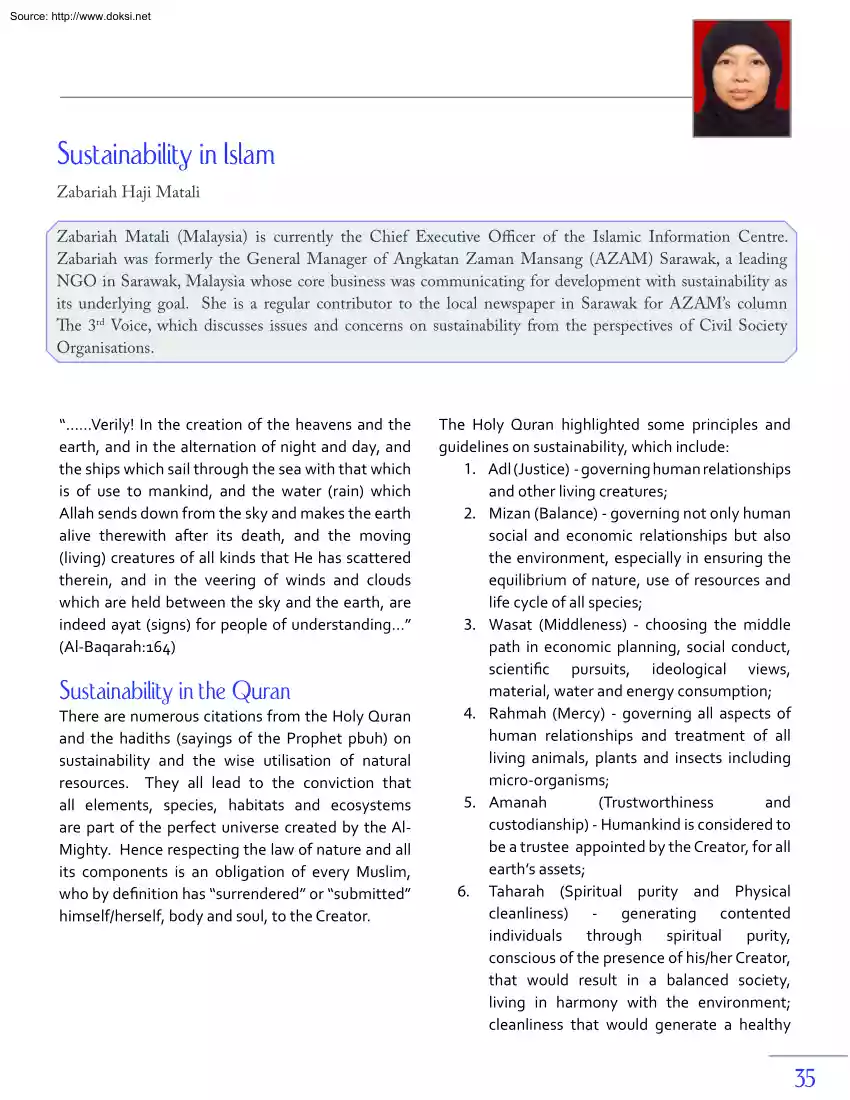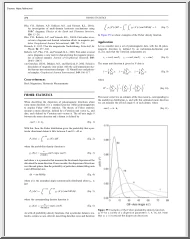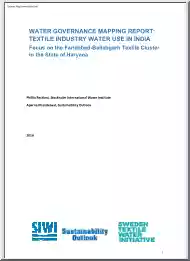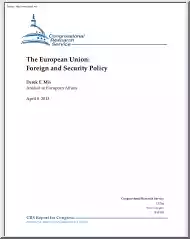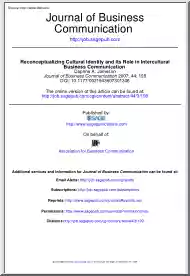Értékelések
Nincs még értékelés. Legyél Te az első!
Mit olvastak a többiek, ha ezzel végeztek?
Tartalmi kivonat
Source: http://www.doksinet Sustainability in Islam Zabariah Haji Matali Zabariah Matali (Malaysia) is currently the Chief Executive Officer of the Islamic Information Centre. Zabariah was formerly the General Manager of Angkatan Zaman Mansang (AZAM) Sarawak, a leading NGO in Sarawak, Malaysia whose core business was communicating for development with sustainability as its underlying goal. She is a regular contributor to the local newspaper in Sarawak for AZAM’s column The 3rd Voice, which discusses issues and concerns on sustainability from the perspectives of Civil Society Organisations. “Verily! In the creation of the heavens and the earth, and in the alternation of night and day, and the ships which sail through the sea with that which is of use to mankind, and the water (rain) which Allah sends down from the sky and makes the earth alive therewith after its death, and the moving (living) creatures of all kinds that He has scattered therein, and in the veering of winds and
clouds which are held between the sky and the earth, are indeed ayat (signs) for people of understanding” (Al-Baqarah:164) Sustainability in the Quran There are numerous citations from the Holy Quran and the hadiths (sayings of the Prophet pbuh) on sustainability and the wise utilisation of natural resources. They all lead to the conviction that all elements, species, habitats and ecosystems are part of the perfect universe created by the AlMighty. Hence respecting the law of nature and all its components is an obligation of every Muslim, who by definition has “surrendered” or “submitted” himself/herself, body and soul, to the Creator. The Holy Quran highlighted some principles and guidelines on sustainability, which include: 1. Adl (Justice) - governing human relationships and other living creatures; 2. Mizan (Balance) - governing not only human social and economic relationships but also the environment, especially in ensuring the equilibrium of nature, use of resources
and life cycle of all species; 3. Wasat (Middleness) - choosing the middle path in economic planning, social conduct, scientific pursuits, ideological views, material, water and energy consumption; 4. Rahmah (Mercy) - governing all aspects of human relationships and treatment of all living animals, plants and insects including micro-organisms; 5. Amanah (Trustworthiness and custodianship) - Humankind is considered to be a trustee appointed by the Creator, for all earth’s assets; 6. Taharah (Spiritual purity and Physical cleanliness) - generating contented individuals through spiritual purity, conscious of the presence of his/her Creator, that would result in a balanced society, living in harmony with the environment; cleanliness that would generate a healthy 35 Source: http://www.doksinet society devoid of air and water pollution, as well as generating a clean economy devoid of usury and deceitful marketing techniques and business transactions; 7. Haq (Truthfulness and Rights) -
Truthfulness in all dealings that recognises the respective rights of others (humans, animals and plants); 8. Ilm Nafi’ (usefulness of knowledge and science) – Knowledge, whether theological, scientific or technological, must be beneficial to others (individuals and society) including future generations. Let’s look at some of the principles or values/ guidelines mentioned above and how these relate to Sustainable Development and Education for Sustainable Development (ESD). i. Adl (Justice) It is mentioned in a hadith that the Prophet S.AW said, “The Earth is a mosque for you, so wherever you are at the time of prayer, pray there”. Treating the Earth like a mosque means treating the natural world with full respect, in a just and fair manner (adl). It means that we as humankind must accept our role as the custodian or steward of the planet, whenever it comes under assault from the actions of our fellow humankind in his/her greed for economic gain and profits. Environmental
pollution and environmental degradation are the results of an unbridled greed, without having any moral and religious consideration towards the Earth as a sacred place, a mosque. Instead the Earth is seen as a reservoir for resource extraction at every opportunity. The Quran says, “Corruption has appeared on land and sea because of what the hands of men have earned, that He (God) may make them taste a part of that which they have done, in order that they may return (by repenting to God and begging His Pardon)”(Ar-Rum:41) 36 ii. Mizan (Balance) Everything in creation is made to exist in a perfect, harmonious balance (mizan). Think of the sun and the moon, which gave us night and day. Since the beginning of time, for millions of years, we have been able to benefit from this balanced system to raise our crops and to know when to sleep, work and pray. Everything has its place on Earth The Quran says, “He has created man. He has taught him speech and Intelligence. The sun and the
moon follow courses (exactly) computed. And the herbs (or stars) and the trees both prostrate to Allah. And the Firmament has He raised high, and He has set up the Balance of (Justice), in order that you may not transgress (due) balance. So establish weight with justice and fall short not in the balance. It is He who has spread out the earth for (His) creatures” (Ar-Rahman: 3 – 10) Everything has been ordered into this delicate balance and reflecting on this balance is a form of worship. “Signs for those who reflect” is a constant reminder of refraining in the Quran. Environmental disasters many a time have destroyed the balance in the constituents of an environment. The Quran teaches humanity not to disrupt this balance. iii. Wasat (Middleness) Linguistically, the word “Wasat” means the just, the best (in goodness), the top choice, the finest, the best (in quality), and the most honorable. Over-consuming can blind us to our role as the stewards of the Earth. Being
custodians of the Earth means we always check our consumption habits, for the Earth and its constituents. Far too often our over-consumption creates increasing waste. The rising amount of garbage results in increased toxicity in the land, the air, the oceans, and the rivers, which sooner or later ends up partly in our bodies. Source: http://www.doksinet Therefore, taking the middle path means not being excessive, nor being miserly in our economic model or set up, in our social conduct, scientific pursuits, ideological views, and material accumulation, as well as our usage of resources like water and energy. The Quran says, “But waste not by excess, for God loves not the wasters.” (Al-A’raf: 31) iv.Amanah (Trustworthiness and Custodianship) We have been entrusted (amanah) with this planet, this is a sacred covenant with our Creator. This trust is an obligation to protect the planet, and it comes with the gifts of many unique abilities such as thought, knowledge, speech and the
wisdom to make appropriate decisions. Amanah is directly linked to the principle of khalifah (steward or vicegerent) of the Earth. As vicegerent of this Earth, we should always remind ourselves that its True Owner is the Creator and all other creations have their rights to inhabit the Earth. God says in the Quran, “And (remember) when your Lord said to the angels: Verily, I am going to place (mankind) generations after generations on Earth. They said: Will You place therein those who will make mischief and shed blood, while we glorify You with praises and thanks and sanctify You. He (God) said: I know that which you do not know” (Al-Baqarah:30) Thus in the scheme of God, humankind is the most dignified and precious of created beings in this universe as the Creator made him His vicegerent. Regrettably, however, humankind rarely acts in the light of this truth, or in an appropriate manner, whether with regard to himself or the people or environment around him. v. Taharah (Spiritual
purity and Physical cleanliness) Islam requires faith and belief (iman) to be founded or based on cleanliness. Some of the pillars/ obligatory rites in Islam, such as the prayer (solat) and the pilgrimage (Hajj) can only be performed in a state of cleanliness by washing in pure, clean water, free from any contamination. Hence, Muslims have a special relationship with water, as an essential element of purification. The Quran gives us the origin and indispensability of water: “He sends down water (rain) from the sky, and the valleys flow according to their measure” (Ar-Rad:17). The Quran also tells us that water will replenish us. He says, “(We) sent down rain from the heavens; and brought forth therewith fruits for your sustenance” (Al-Baqarah:22). Also, the Quran talks about how living things were made from water: “.And We have made from water every living thing.” (Al-Anbiya:30) An established scientific fact: no water, no life anywhere! The Quran forewarned this, and
humankind has not appreciated this fact nor cared about it. Given the importance of water in our lives, we cannot take this provision for granted. According to a report by ISESCO (Islamic Educational, Scientific and Cultural Organisation), scarcity of fresh water resources is expected to be the second most acute challenge for the world in general and Islamic countries in particular. There are numerous values and principles in Islam which are in accord with the values and principles enshrined in Education for Sustainable Development and the Earth Charter, and yet not much is known of this. We need to tell our stories and our purpose and the role we play and should play as stewards/ khalifah of this planet. Personally I believe Education for Sustainable Development (ESD) and the Earth Charter has allowed us to tell our story and share with people of other faith traditions, to connect and find better ways and a common platform as “people of faith” to reduce the impact of our actions.
More importantly I believe ESD and the Earth Charter allow us to be creative and innovative in not only 37 Source: http://www.doksinet approaching or handling issues and concerns of sustainability, but also in communicating the values and principles of our faith to society as we strive to be the best we can in protecting our planet. References Abdul-Matin, Ibrahim. Green Deen: What Islam Teaches About Protecting the Planet. San Francisco, Berrett-Koehler Publishers, Inc, 2010. AbedAl-Rahim, Dr. MahmoudYousef Environmental Sustainability and Islam. 2010, retrieved The Royal Aal al-Bayt Institute for Islamic Thought 15th General Conference. Brundtland Report. 1987, retrieved from http:// www.sd-networkeu Muhammad Nasir, Dr Amina. Islam and the Protection of the Environment. 1995, retrieved March 5, 2011 from http://www. isesco.orgma Report on ISESCO’s Efforts and Future Vision in the Field of Management of Water Resources in the Islamic World. 2010, retrieved March 6, 2011 from
http://www.isescoorgma T S Al-Hassani, Prof. Salim 1000 Years Amnesia: Environment Tradition in Muslim Heritage. 2009, retrieved March 5, 2011 from http:// www.muslimheritagecom 38
clouds which are held between the sky and the earth, are indeed ayat (signs) for people of understanding” (Al-Baqarah:164) Sustainability in the Quran There are numerous citations from the Holy Quran and the hadiths (sayings of the Prophet pbuh) on sustainability and the wise utilisation of natural resources. They all lead to the conviction that all elements, species, habitats and ecosystems are part of the perfect universe created by the AlMighty. Hence respecting the law of nature and all its components is an obligation of every Muslim, who by definition has “surrendered” or “submitted” himself/herself, body and soul, to the Creator. The Holy Quran highlighted some principles and guidelines on sustainability, which include: 1. Adl (Justice) - governing human relationships and other living creatures; 2. Mizan (Balance) - governing not only human social and economic relationships but also the environment, especially in ensuring the equilibrium of nature, use of resources
and life cycle of all species; 3. Wasat (Middleness) - choosing the middle path in economic planning, social conduct, scientific pursuits, ideological views, material, water and energy consumption; 4. Rahmah (Mercy) - governing all aspects of human relationships and treatment of all living animals, plants and insects including micro-organisms; 5. Amanah (Trustworthiness and custodianship) - Humankind is considered to be a trustee appointed by the Creator, for all earth’s assets; 6. Taharah (Spiritual purity and Physical cleanliness) - generating contented individuals through spiritual purity, conscious of the presence of his/her Creator, that would result in a balanced society, living in harmony with the environment; cleanliness that would generate a healthy 35 Source: http://www.doksinet society devoid of air and water pollution, as well as generating a clean economy devoid of usury and deceitful marketing techniques and business transactions; 7. Haq (Truthfulness and Rights) -
Truthfulness in all dealings that recognises the respective rights of others (humans, animals and plants); 8. Ilm Nafi’ (usefulness of knowledge and science) – Knowledge, whether theological, scientific or technological, must be beneficial to others (individuals and society) including future generations. Let’s look at some of the principles or values/ guidelines mentioned above and how these relate to Sustainable Development and Education for Sustainable Development (ESD). i. Adl (Justice) It is mentioned in a hadith that the Prophet S.AW said, “The Earth is a mosque for you, so wherever you are at the time of prayer, pray there”. Treating the Earth like a mosque means treating the natural world with full respect, in a just and fair manner (adl). It means that we as humankind must accept our role as the custodian or steward of the planet, whenever it comes under assault from the actions of our fellow humankind in his/her greed for economic gain and profits. Environmental
pollution and environmental degradation are the results of an unbridled greed, without having any moral and religious consideration towards the Earth as a sacred place, a mosque. Instead the Earth is seen as a reservoir for resource extraction at every opportunity. The Quran says, “Corruption has appeared on land and sea because of what the hands of men have earned, that He (God) may make them taste a part of that which they have done, in order that they may return (by repenting to God and begging His Pardon)”(Ar-Rum:41) 36 ii. Mizan (Balance) Everything in creation is made to exist in a perfect, harmonious balance (mizan). Think of the sun and the moon, which gave us night and day. Since the beginning of time, for millions of years, we have been able to benefit from this balanced system to raise our crops and to know when to sleep, work and pray. Everything has its place on Earth The Quran says, “He has created man. He has taught him speech and Intelligence. The sun and the
moon follow courses (exactly) computed. And the herbs (or stars) and the trees both prostrate to Allah. And the Firmament has He raised high, and He has set up the Balance of (Justice), in order that you may not transgress (due) balance. So establish weight with justice and fall short not in the balance. It is He who has spread out the earth for (His) creatures” (Ar-Rahman: 3 – 10) Everything has been ordered into this delicate balance and reflecting on this balance is a form of worship. “Signs for those who reflect” is a constant reminder of refraining in the Quran. Environmental disasters many a time have destroyed the balance in the constituents of an environment. The Quran teaches humanity not to disrupt this balance. iii. Wasat (Middleness) Linguistically, the word “Wasat” means the just, the best (in goodness), the top choice, the finest, the best (in quality), and the most honorable. Over-consuming can blind us to our role as the stewards of the Earth. Being
custodians of the Earth means we always check our consumption habits, for the Earth and its constituents. Far too often our over-consumption creates increasing waste. The rising amount of garbage results in increased toxicity in the land, the air, the oceans, and the rivers, which sooner or later ends up partly in our bodies. Source: http://www.doksinet Therefore, taking the middle path means not being excessive, nor being miserly in our economic model or set up, in our social conduct, scientific pursuits, ideological views, and material accumulation, as well as our usage of resources like water and energy. The Quran says, “But waste not by excess, for God loves not the wasters.” (Al-A’raf: 31) iv.Amanah (Trustworthiness and Custodianship) We have been entrusted (amanah) with this planet, this is a sacred covenant with our Creator. This trust is an obligation to protect the planet, and it comes with the gifts of many unique abilities such as thought, knowledge, speech and the
wisdom to make appropriate decisions. Amanah is directly linked to the principle of khalifah (steward or vicegerent) of the Earth. As vicegerent of this Earth, we should always remind ourselves that its True Owner is the Creator and all other creations have their rights to inhabit the Earth. God says in the Quran, “And (remember) when your Lord said to the angels: Verily, I am going to place (mankind) generations after generations on Earth. They said: Will You place therein those who will make mischief and shed blood, while we glorify You with praises and thanks and sanctify You. He (God) said: I know that which you do not know” (Al-Baqarah:30) Thus in the scheme of God, humankind is the most dignified and precious of created beings in this universe as the Creator made him His vicegerent. Regrettably, however, humankind rarely acts in the light of this truth, or in an appropriate manner, whether with regard to himself or the people or environment around him. v. Taharah (Spiritual
purity and Physical cleanliness) Islam requires faith and belief (iman) to be founded or based on cleanliness. Some of the pillars/ obligatory rites in Islam, such as the prayer (solat) and the pilgrimage (Hajj) can only be performed in a state of cleanliness by washing in pure, clean water, free from any contamination. Hence, Muslims have a special relationship with water, as an essential element of purification. The Quran gives us the origin and indispensability of water: “He sends down water (rain) from the sky, and the valleys flow according to their measure” (Ar-Rad:17). The Quran also tells us that water will replenish us. He says, “(We) sent down rain from the heavens; and brought forth therewith fruits for your sustenance” (Al-Baqarah:22). Also, the Quran talks about how living things were made from water: “.And We have made from water every living thing.” (Al-Anbiya:30) An established scientific fact: no water, no life anywhere! The Quran forewarned this, and
humankind has not appreciated this fact nor cared about it. Given the importance of water in our lives, we cannot take this provision for granted. According to a report by ISESCO (Islamic Educational, Scientific and Cultural Organisation), scarcity of fresh water resources is expected to be the second most acute challenge for the world in general and Islamic countries in particular. There are numerous values and principles in Islam which are in accord with the values and principles enshrined in Education for Sustainable Development and the Earth Charter, and yet not much is known of this. We need to tell our stories and our purpose and the role we play and should play as stewards/ khalifah of this planet. Personally I believe Education for Sustainable Development (ESD) and the Earth Charter has allowed us to tell our story and share with people of other faith traditions, to connect and find better ways and a common platform as “people of faith” to reduce the impact of our actions.
More importantly I believe ESD and the Earth Charter allow us to be creative and innovative in not only 37 Source: http://www.doksinet approaching or handling issues and concerns of sustainability, but also in communicating the values and principles of our faith to society as we strive to be the best we can in protecting our planet. References Abdul-Matin, Ibrahim. Green Deen: What Islam Teaches About Protecting the Planet. San Francisco, Berrett-Koehler Publishers, Inc, 2010. AbedAl-Rahim, Dr. MahmoudYousef Environmental Sustainability and Islam. 2010, retrieved The Royal Aal al-Bayt Institute for Islamic Thought 15th General Conference. Brundtland Report. 1987, retrieved from http:// www.sd-networkeu Muhammad Nasir, Dr Amina. Islam and the Protection of the Environment. 1995, retrieved March 5, 2011 from http://www. isesco.orgma Report on ISESCO’s Efforts and Future Vision in the Field of Management of Water Resources in the Islamic World. 2010, retrieved March 6, 2011 from
http://www.isescoorgma T S Al-Hassani, Prof. Salim 1000 Years Amnesia: Environment Tradition in Muslim Heritage. 2009, retrieved March 5, 2011 from http:// www.muslimheritagecom 38
